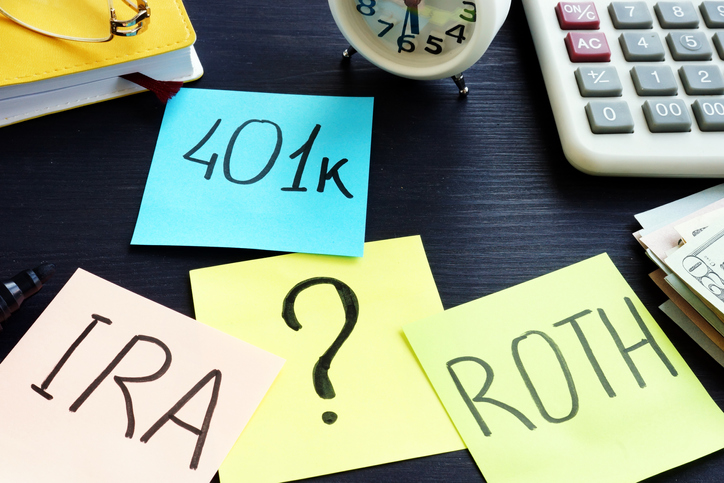You may have heard of a 401(k) account being something employers offer. Your employer may even offer it. But have you heard of an IRA? Both 401(k)s and IRAs are retirement accounts, and you should likely be contributing to one or both of them to plan for your retirement. There are many similarities between these two kinds of accounts, but many important differences, as well. Here we’ll break down for you the unique attributes of both kinds of accounts so you can make educated choices about where you want to place your money.
What is a 401(k)?
A 401(k) is a type of retirement account set up by your employer where you can contribute money from your paycheck. There are two kinds of 401(k)s–a regular 401(k) and a Roth 401(k).
Traditional 401(k)
With a traditional 401(k), you contribute pre-tax money from your salary, which means you don’t pay taxes on the money you contribute today, but you will have to pay taxes on it when you take it out for retirement. At that stage in your life, you will likely be in a lower tax bracket because your earnings will be less, so you may not have to take out as much in taxes. The other benefit to taking out money pre-tax is that your taxable income is lowered, which means you may not have to pay as much in taxes from your current paycheck.
Roth 401(k)
When you contribute to a Roth 401(k), you pay taxes on that money along with your regular paycheck. However, this means that whatever is in your account–including whatever you earn on that money over time–is completely yours and you won’t have to pay any further taxes on it.
Benefits to a 401(k)
- You get a tax benefit (either on the front end or on the back end of contributing money)
- Your employer can contribute to your account
- Money is taken automatically from your paycheck, so you won’t even miss it
- Earnings grow tax-free
What is an IRA?
Like 401(k)s, IRA accounts are retirement accounts and they come in two varieties. The traditional IRA and the Roth IRA. The differences between an IRA and a Roth IRA account are pretty much the same as the differences between a 401(k) and a Roth 401(k). Like with 401(k)s, you can contribute to an IRA with pre-tax dollars and pay taxes later or contribute to a Roth IRA with post-tax dollars and not have to pay taxes upon withdrawal.
Benefits to an IRA
- You get a tax benefit on the front-end or the back-end.
- IRAs offer a variety of investment options if held by an investment firm
- Earnings grow tax-free
So What’s the Difference Between an IRA vs. a 401(k)?
So which form of retirement savings should you choose? An IRA or a 401(k)? The answer is: it depends. Every person’s situation is different, which means that there is no across-the-board right answer. In general when it comes to saving and investing money, the rule of thumb is to diversify. That means to place your money in a variety of accounts so that you are not solely dependent on one option.
You also need to consider what opportunities are in front of you. If your employer offers any kind of matching to your 401(k) contributions, it’s a good idea to take advantage of that plan, as you’re basically getting free money. However, there are limits on what you can do with your money when it’s in a 401(k), which might make it a good idea to have at least some money in an IRA account that you can invest and hope to grow over time.
No matter what your employment and financial situation, you have options. At DeSantis, Kiefer, Shall, & Sarcone, our job is to help you understand those options and come up with a plan that makes the most sense for your financial needs and goals. No matter how you choose to save for your retirement, you can always make changes along the way. We continue to work with you over the years to make sure you are comfortable with where your money is sitting and how it is growing, so that you can achieve all your financial goals!






